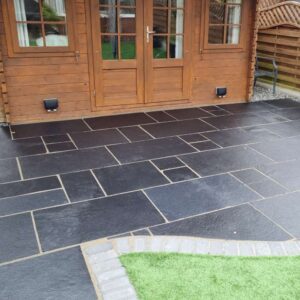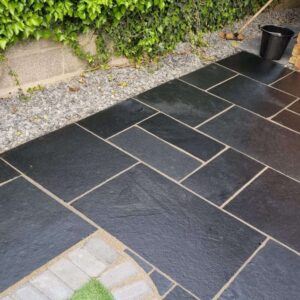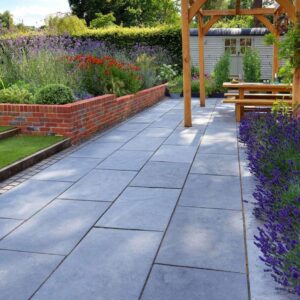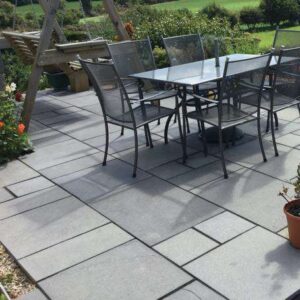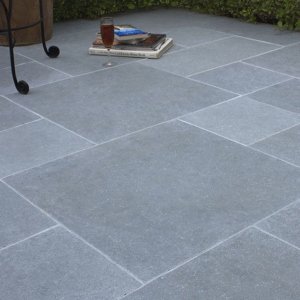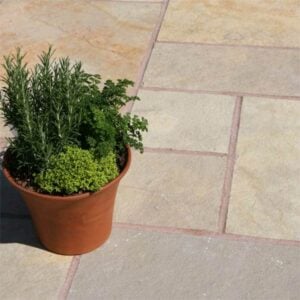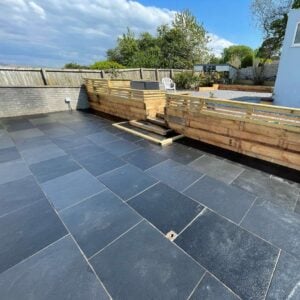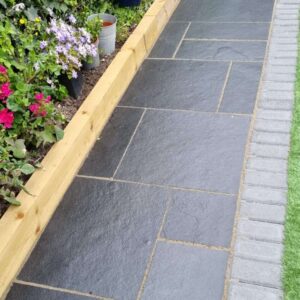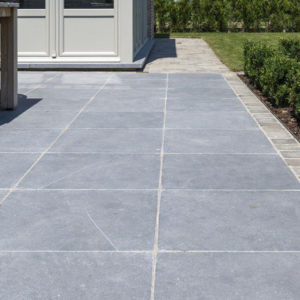Limestone Paving
Tandur Antique Yellow Tumbled Indian Limestone Paving Slabs – Patio Pack – 22mm Calibrated
Limestone Paving
Kotah Black Hand Cut Edge Indian Limestone Paving Slabs – 600x600mm – 22mm Calibrated
Limestone Paving
Kotah Black Hand Cut Edge Indian Limestone Paving Slabs – 900x600mm – 22mm Calibrated
Limestone Paving Slabs
Limestone paving slabs are a stylish and durable option for your garden that can handle all weather conditions with ease. Natural Indian limestone is renowned for its beautiful colours and shades, as well as its incredibly hard-wearing and versatile properties. Indian Limestone Paving Slabs are the most popular to mimic the appearance of your garden or landscape. They are available in different colours, shapes, & sizes to help you create the garden of your dreams.
Indian limestone slabs features and specifications
Indian limestone paving slabs offer a fantastic way of using natural stone to create a charming and rustic space whilst also being incredibly cost effective. Our Indian limestone patio slabs are formed naturally in caves, on sea beds and mountains, which is the reason it works so well within a natural environment. Available in a range of elegant and stylish colours, tones, and textures, our natural limestone patio slabs are extremely dense with low porosity. Its naturally glossy surface has surprising anti-slip properties, making it perfect for the Great British weather.- Little to no maintenance required to look stunning all year round
- Suitable for all weather types –perfect for British gardens!
- Outdoor limestone slabs provide a naturally smooth surface whilst still being slip resistant
- Excellent load bearing properties mean the paving tiles are solid, durable, and long-lasting
What are the different types of limestone patio slabs?
All our Indian limestone paving slabs can be used in a variety of different ways, and they are all categorised according to their colour and finishing process. Kota black limestone paving – this is a distinctive colour of limestone with a naturally black riven surface to add a dramatic and intriguing finish to your garden. Blue Indian limestone paving – a stunning and contemporary blue natural stone that blends warm greys, light blues and with a hint of cream. This limestone will add a calming and serene atmosphere to your garden. Tandur yellow limestone paving – this is a natural blend of warm yellows with hints of grey, gold and even green tones. Tandur yellow limestone will add a rustic charm to your garden and offer a warm and welcoming effect wherever you choose to use it. Whether you are looking for limestone paving slabs or Indian sandstone paving slabs, we have a wide range of colours, textures, and styles for you to choose from. All our paving slabs are priced to suit every budget, and we are here to help you create the garden of your dreams.Natural Variation information
As limestone is a natural stone, there will be slight colour variations between each paving slab. You may also find that there are brown markings on natural stone, which is caused by the oxidisation of any iron which may naturally occur in the stone. Don’t worry, this will blend in over time. No two natural limestone paving slabs will look the same and will add to the rustic, classic limestone paving look.Installation and Aftercare
To install your limestone paving stones, you will need to use a full bed of semi-wet mix of ratio 5:1 sharp sand to cement. You will need to ensure that the groundwork is prepared correctly and the base is approximately 1520mm deep. Your base should be even and solid and may require an additional level of sand or fine gravel to help your paving stones bond securely. The paving stones will need to be primed before they are laid with a priming slurry to further help the adhesion. Your limestone slab patio should be swept regularly and cleaned once or twice a year to keep it looking fantastic and to protect the surface of the stone. Be careful if you use a pressure washer, as this could affect the surface of the slabs. We recommend that you use warm soapy water (using a PH neutral detergent) and a soft bristled brush to clean your natural stone paving. Never use acid-based cleaning products as this can stain and affect the colour of your natural stone.FAQs
What is Indian limestone paving?
Indian limestone is a material commonly used for patios and driveways, best known for its attractive natural colours and textures.Is limestone any good for patios?
Limestone is a perfect option for outdoor patios as it is smooth and flat, providing the ideal coverage for large areas. It is also extremely hard wearing and durable, as well as only absorbing a minimal amount of water so you can use it anywhere – patios, pool areas, courtyards, and driveways.How do you clean limestone?
Cleaning limestone is easy and simple – all you need to do is use soapy water and scrub at the surface with a stiff brush. You should never use acid-based detergents on sandstone as this can end up changing the colour and appearance of your patio permanently.Is limestone paving slippery when wet?
Much like any other stone surface, limestone can be slippery when wet. However, the slabs do have a naturally textured surface with small dents in that can provide grip when needed. You will need to take care as the stones become weathered with foot traffic, as this can also increase the slippiness of the stones.Do you need to seal limestone pavers?
Sealing your limestone is essential to ensuring that your patio or driveway stays in its best condition. Outdoor limestone will require little maintenance if it has been properly sealed, and you will need a deep penetrating sealant to give the best possible protection. Simply brush a few layers of the sealant onto your limestone paving slabs before laying and allow the sealant to soak in and dry before you start.How often do you need to seal your limestone tiles?
To prolong the life of your natural stone tiles, regular cleaning and maintenance is required. It is essential that you seal your limestone tiles once every 3 – 5 years to protect them from weathering and UV rays, and ultimately keep them looking brand new for decades.Is limestone good for outdoor paving?
Limestone is a perfect option for outdoor paving as it is smooth and flat, providing the ideal coverage for large areas. It is also extremely hard wearing and durable, as well as only absorbing a minimal amount of water so you can use it anywhere – patios, pool areas, courtyards, and driveways.How long does limestone last?
Once your limestone paving has been installed, you can expect it to last for decades with the proper maintenance and cleaning. Limestone is renowned for being hard wearing, durable and extremely strong with minimum water absorption so you don’t have to worry about moss and algae ruining your outdoor space.How much does limestone cost?
Limestone is available in various sizes to suit all your outdoor project needs. The cost will depend on the size of the area you wish to pave to the size of the flags you wish to use to achieve your desired look. On average, you can expect black limestone to cost £28.00 per metre square.How heavy is a limestone slab?
If you have a slab that is 20mm thick, it should weigh approximately 29.30kg. if you have a slab that Is 25mm thick, it should weigh approximately 36.0kg. Remember, these are rough weights for standard slab sizes, so make sure that you measure correctly for a more accurate weight.Does limestone scratch easily?
Due to how densely packed the particles are in limestone, it can scratch when scraped with something sharp. However, scratches always look worse when they have first occurred due to the chalky material that clusters round it. If you simply wipe the scratch, you will find that you can barely see it.Does limestone paving stain?
Frequent cleaning should prevent your limestone paving from staining, but there will be instances where embedded debris can cause small stains. You can deal with these stains by cleaning your limestone paving with warm water and a PH neutral diluted detergent and a soft bristled brush. Do not use acid-based cleaners to clean your limestone as this will affect the colour and texture of the natural stone.How do you get oil stains out of limestone?
If you do find that your limestone has stained, then stay away from the bleach or any harsh cleaning products. Instead, start by using a damp cloth or a soft bristles brush and warm water and see if the stain can be removed. If you find that this still isn’t working, you can try a specialist limestone stain removal cleaner.How can we protect Indian limestone pavers?
It is generally advised to seal your limestone before laying it, and to re-apply the sealant regularly over the years. This will prevent any staining, weathering, and prevent the growth of moss and algae. If you choose a UV sealant, this will also help to slow down the fading and the ageing process that comes with exposure to the sun.What limestone slab sizes are available?
Limestone slabs are available in a variety of different sizes in order to accommodate your outdoor design ideas. The most common sizes include:- 900 x 600
- 600 x 600
- 600 x 300
- 450 x 450
- 300 x 300
- 290 x 290


